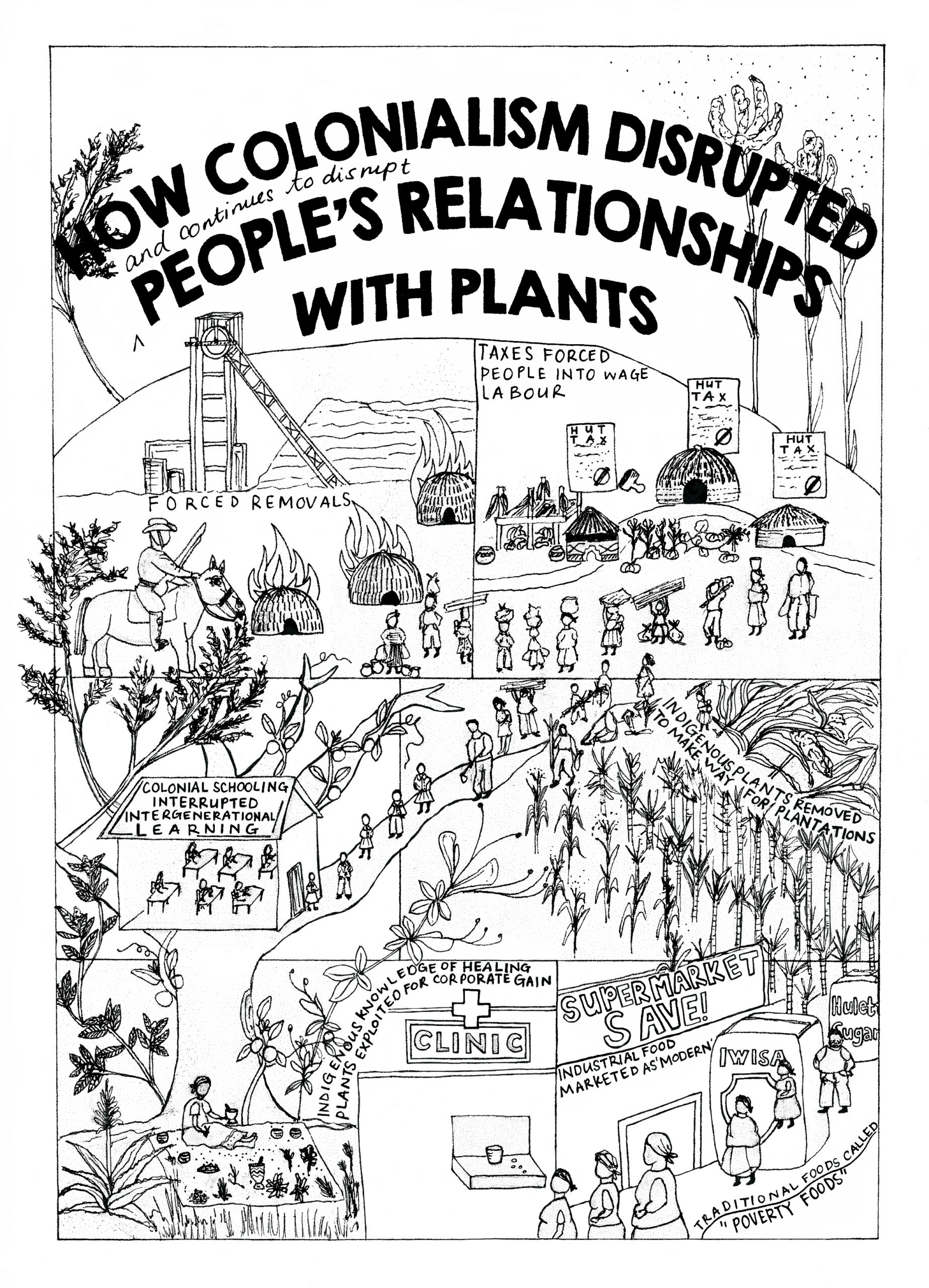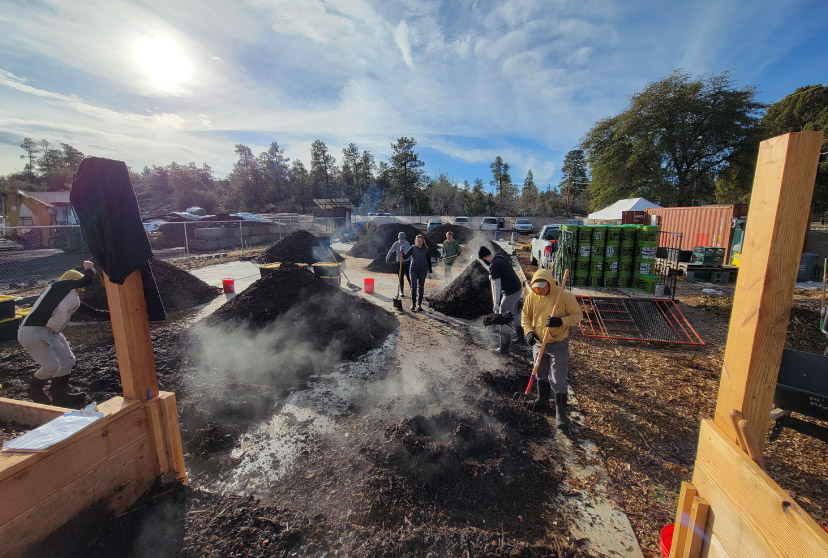
By: Claire Rousell and Brittany Kesselman
16 / October / 2024
Our graphic grew out of a project called ‘Decolonising food for health and sustainability’ in Johannesburg, South Africa. The project recognised that being able to grow the indigenous plants that people traditionally used for food and medicine could help communities to enjoy greater food sovereignty and more control over their own health. The graphic seeks to tell the complex story of the historical and ongoing negative impacts of colonialism in a simple and powerful way. The accompanying text explains some of the ways colonialism disrupted Indigenous people’s relationship with plants, and how these processes and power relations continue to underpin South Africa’s unhealthy and unsustainable food system.
This graphic was created as part of the project, ‘Decolonising food for health and sustainability,’ implemented in Johannesburg, South Africa. Being able to grow the indigenous plants traditionally used for food and medicine could help communities to enjoy greater food sovereignty and more control over their health. Therefore, the project sought to link people who have knowledge regarding the collection, cultivation and use of indigenous plants for food and medicine with communities struggling with food insecurity and poor health. One outcome of the project was the publication, in print and online, of a booklet containing this graphic. It was released in English and three other South African languages, isiZulu, Setswana and Tshivenda.
The graphic[1] seeks to tell the complex story of the historical and ongoing negative impacts of colonialism on Indigenous people’s relationship with plants in a simple and powerful way. The patterns of capitalist, racial, patriarchal power put in place under colonialism continue to underpin South Africa’s contemporary food system, yet many South Africans are unaware of this history (Kesselman, 2023). Colonialism, and later apartheid, violently disrupted Indigenous peoples’ relationships with plants in multiple ways. The most obvious was the physical separation of people from the land through land seizure and forced removals. Also important was the clearing of biodiverse indigenous landscapes to create monoculture plantations for export crops (Moodie, 1838). The imposition of colonial taxes deliberately forced self-sufficient Africans into the cash economy. To generate currency for tax payments, Africans had to either switch from subsistence production of traditional foods to cash crops for the market, or leave the land to work for wages on colonial farms, or later, mines. Colonial schooling interrupted embodied and land-based intergenerational plant knowledge transmission. Schooling was underpinned by Eurocentrism, which claimed the superiority of all things European and disparaged traditional foods as poverty foods. This continued under the industrial food system (represented in the graphic by Iwisa maize meal and Huletts sugar, two prominent processed foods), which presents traditional foods as backwards. Indigenous healing plant knowledge was dismissed as witchcraft, though later exploited for corporate gain.
This history underpins the contemporary food crisis in South Africa. The current food system produces very unhealthy outcomes, including malnutrition, child stunting (28.8%) and food insecurity (63.5%), as well as diet-related non-communicable diseases such as diabetes and hypertension (Simelane et al., 2023). In addition, the food system contributes to greenhouse gas emissions, pollution, loss of biodiversity and other environmental harms (FAO et al., 2022). Food system workers often face exploitation, low pay and hazardous working conditions, while executives receive high salaries that can reach over 1000 times those of low-paid workers (Staff Writer, 2023). Profits generated in food manufacturing and retail are amongst the highest in the country (Greenberg, 2015). The historical roots of this unhealthy, unsustainable and unjust food system can be traced back to colonialism—that is the story we seek to tell in this graphic.
FAO, European Union, CIRAD, & DSI-NRF Centre of Excellence in Food Security (CoE-FS). (2022). Food Systems Profile – South Africa. In Food Systems Profile – South Africa. FAO, CIRAD, EU. https://doi.org/10.4060/cc0071en
Greenberg, S. (2015). Corporate Concentration and Food Security in South Africa: Is the Commercial Agro-food System Delivering? Institute for Poverty, Land and Agrarian Studies (PLAAS), University of the Western Cape.
Kesselman, B. (2023). Transforming South Africa’s unjust food system: an argument for decolonization. Food, Culture and Society, 00(00), 1–18. https://doi.org/10.1080/15528014.2023.2175483
Moodie, D. (Ed.). (1838). The Record; or, a series of official papers relative to the condition and treatment of the native tribes of South Africa. Part 1 1649-1720. AS Robertson.
Simelane, T., Mutanga, S., Hongoro, C., Parker, W., Mjimba, V., Zuma, K., Kajombo, R., Ngidi, M., Masamha, B., Mokhele, T., Managa, R., Ngungu, M., Sinyolo, S., Tshililo, F., Ubisi, N., Skhosana, F., Ndinda, C., Sithole, M., Muthige, M., Lunga, W., Tshitangano, F., Dukhi, N., Sewpaul, R., Mkhongi, A., & Marinda, E. (2023). National Food and Nutrition Security Survey: National Report. HSRC.
Staff Writer. (2023, October 19). Retail CEO earning up to R330,000 a day – Woolies vs Pick n Pay vs Shoprite. Business Tech. https://businesstech.co.za/news/wealth/726032/retail-ceo-earning-up-to-r330000-a-day-woolies-vs-pick-n-pay-vs-shoprite/
[1] The graphic was conceptualised by Claire Rousell and Brittany Kesselman, drawn by Claire Rousell, with text by Brittany Kesselman and Claire Rousell.
6 / February / 2026
By: Manapee Khongrakchang

20 / October / 2024
By: Zachary Joseph Czuprynski and Rebecca Marie Serratos

16 / October / 2024
By: Claire Rousell and Brittany Kesselman

5 / July / 2024
By: Nathalia Lizarraga Conchatupa

23 / May / 2022
By: Angie Vanessita
